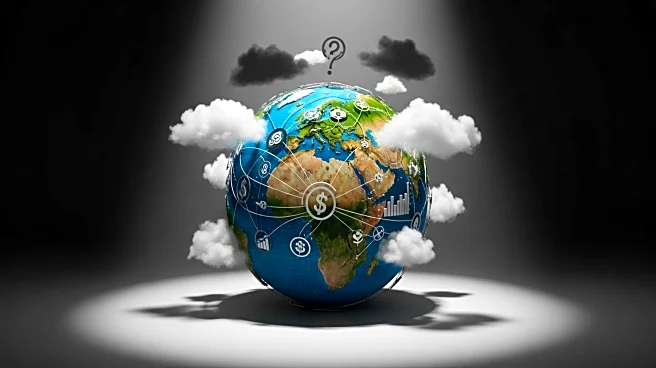What is the story about?
What's Happening?
The World Trade Organization (WTO) has forecasted a significant slowdown in global goods trade growth for 2026, attributing this to the delayed impact of tariffs imposed by President Trump. The WTO's report indicates that merchandise trade volumes are expected to rise by 2.4% in 2025, a notable increase from the 0.9% growth predicted earlier. However, the outlook for 2026 has been downgraded to a mere 0.5% growth, down from the previous estimate of 1.8%. This shift suggests that the full effects of the tariffs on US imports will be felt next year, as accumulated inventories are drawn down and GDP growth slows. The report also highlights signs of weakness in trade and manufacturing output in developed economies, including reduced business and consumer confidence.
Why It's Important?
The anticipated slowdown in trade growth due to US tariffs could have significant implications for global commerce and economic stability. As tariffs increase costs for businesses and consumers, they may lead to reduced spending and investment, impacting economic growth. The WTO's report underscores the resilience of certain economies despite unilateral trade measures, suggesting that a core group of countries continues to provide stability in the global trading system. However, the broader impact of tariffs could lead to decreased employment and income growth, affecting economic stakeholders worldwide. The focus on AI-related goods as a driver of trade growth highlights the shifting dynamics in global commerce, with technology playing a crucial role in economic activity.
What's Next?
As the global economy cools and the full impact of higher tariffs is felt, businesses and policymakers may need to adapt to changing trade dynamics. Companies might reconsider their supply chains and sourcing strategies to mitigate tariff impacts. Policymakers could face pressure to negotiate trade agreements or adjust tariffs to support economic growth. The WTO's forecast suggests that trade policy uncertainty will continue to influence global commerce, potentially leading to further shifts in trade patterns and economic strategies.
Beyond the Headlines
The focus on AI-related goods as a major contributor to trade growth highlights the increasing importance of technology in global commerce. This trend could lead to long-term shifts in trade patterns, with countries investing more in technology sectors to capitalize on growth opportunities. The ethical and legal dimensions of AI trade, including data privacy and intellectual property rights, may become more prominent as technology continues to drive economic activity.

















